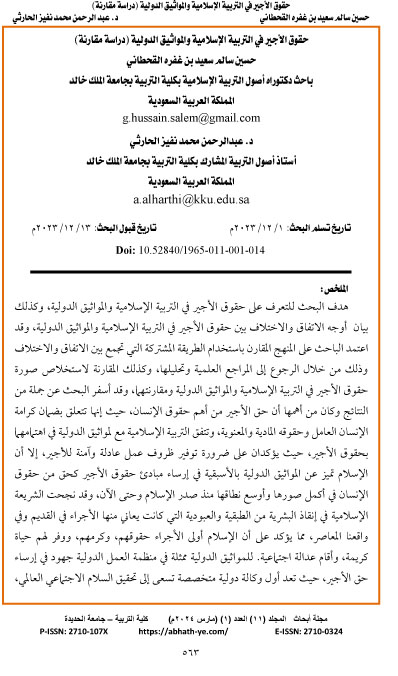The Rights of the Worker in Islamic Education and International Conventions (A Comparative Study)
Keywords:
Workers' rights, international conventions, labor rights, human rightsAbstract
The aim of this research is to identify the rights of workers in Islamic education and international conventions, as well as to highlight the agreements and differences between the rights of workers in Islamic education and international conventions. The researcher adopted a comparative approach using the common method that combines agreements and differences, through referring to scientific references and analyzing them. The research also involves comparing and extracting a picture of the rights of workers in Islamic education and international conventions, and comparing them. The research yielded a number of results, the most important of which is that the right of workers is one of the most important human rights, as it relates to ensuring the dignity of the working individuals and their material and moral rights. Islamic education and international conventions are in conformity in their concern for the rights of workers, emphasizing the necessity of providing fair and safe working conditions for workers. Yet, Islam takes precedence in establishing the principles of workers' rights as a human right in a complete and comprehensive vision since its inception and until now. Islamic law has succeeded in saving humanity from classism and slavery, which workers suffered from in the past and in our contemporary reality, affirming that Islam prioritizes their rights and dignity, as well as provides them with a decent life and establishes social justice. International conventions, represented by the International Labor Organization, have made efforts to establish the right of workers, as the first specialized international agency seeking to achieve global social peace. This organization has played an important role in developing labor legislation worldwide. However, its efforts are not sufficient as it records numerous violations of the right to work, which can be attributed to the absence of enforceability in its decisions. The rights granted to workers by Islam are not a gift that can be taken back at will by anyone who grants them, but they are rights that God has bestowed upon His servants; like other rights, neglecting them incurs sin on the negligent party. International conventions have agreed with Islam in considering the work of the worker and their wages as a means to preserve their dignity from humiliation and degradation. If the employer wrongs the worker in any way, whether by depriving them of all or part of their wages, the worker has the right to sue the employer and lodge a complaint with the guardian or the judge acting on his/her behalf, in order to reclaim their stolen rights. Those who infringe upon the rights of workers are considered to commit injustice, oppression, religious transgression, and legal violation. The research also revealed differences between international conventions and Islam in the basis for estimating and determining the worker's wage, as well as in the concept of guaranteeing the worker's rights. The rights that have been agreed upon do not prevent us from acknowledging that there are many other rights on which there is agreement and disagreement.

Downloads
Published
How to Cite
Issue
Section
License
Copyright (c) 2024 ِabhath Journal for the Humanities

This work is licensed under a Creative Commons Attribution 4.0 International License.
- البحوث المنشورة في المجلة مرخصة بموجب ترخيص (CC BY 4.0) Creative Commons Attribution 4.0 الدولي.
- تسمح المجلة بإعادة نسخ وتوزيع ونقل العمل لأي وسط أو شكل لأي غرض.
- تسمح بالتعديل والتحويل، والإضافة على العمل مع نسبة ذلك إلى المؤلف.
- حقوق النشر يحتفظ بها الباحثون.




